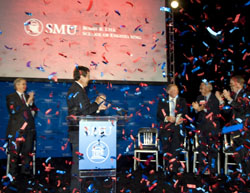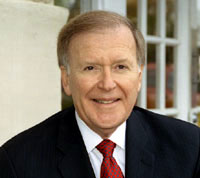SMU Names Engineering School, Launches New Initiatives
SMU is naming its School of Engineering in honor of Bobby B. Lyle, a Dallas entrepreneur and industry leader.

DALLAS (SMU) — Southern Methodist University today is naming its School of Engineering in honor of Bobby B. Lyle, a Dallas entrepreneur and industry leader who has been instrumental in shaping the direction and growing prominence of the school.
Although the 83-year-old School of Engineering has enjoyed a strong history of success, producing graduates who have become international leaders in technology, industry and public policy, the School of Engineering had remained the only unnamed school at SMU, until today.
"Over the past several years, Bobby Lyle has spent countless hours helping to chart a course that will position the school for national leadership in American higher education," said SMU President R. Gerald Turner. "In recognition of his leadership, we are honored today to name the Bobby B. Lyle School of Engineering at SMU. No one in the history of the School of Engineering has brought more dedication, support and commitment to its permanent development than has Dr. Lyle. With the naming of the Bobby B. Lyle School of Engineering, we are confirming our commitment to leadership in engineering education and securing the school’s bright and promising future."
Lyle has served as an SMU trustee for 20 years. As a member of the Engineering Executive Board, he has worked with Engineering Dean Geoffrey Orsak and the faculty to introduce several new major initiatives expanding the school’s focus on technology leadership, engineering activism and social responsibility. As an SMU trustee, Dr. Lyle serves on the University Audit Committee; Executive Committee; Academic Policy, Planning and Management Committee; Compensation Committee; and as chair of the Buildings and Grounds Committee.
"The vision and plan for the Lyle School of Engineering calls for the development of activist engineers with deep technical skills who are committed to solving large-scale challenges that expand our economy and address the pressing needs of the world’s communities," Orsak said. "The educational and research focus will be on providing new radical innovation skills together with the leadership and professional development skills needed by U.S. engineers to expand their global competitiveness. With this landmark plan, the Lyle School of Engineering provides a new national template for engineering in the 21st century."
"By incorporating business and leadership training into the engineering curriculum, SMU’s School of Engineering is grooming today’s engineering students to be tomorrow’s engineering leaders and entrepreneurs," Lyle said. "Our programs are designed to move beyond traditional engineering education as we prepare our students to provide leadership in the application of technology to solve real world problems. This calls for engineers with strong skills of oral and written communication, creative thinking and a broad understanding of societal and economic issues. I am grateful and humbled by the University’s decision to name the Lyle School of Engineering at SMU and am extremely excited that we have crafted a strategic plan for the school that has the potential to advance engineering education on a worldwide basis."
Among the many new initiatives announced today, SMU is establishing the Lockheed Martin Skunk Works® Lab at the SMU Lyle School of Engineering. Through this partnership with Lockheed Martin, SMU will be the first university in the nation to create and host a Skunk Works® Lab. The lab will be modeled closely on the iconic and top-secret California research and development facility created by Lockheed Martin to solve the "toughest technology problems facing this country," Orsak said.
"The Lockheed Martin Skunk Works® Lab at the SMU Lyle School of Engineering will involve small, focused groups of students and faculty who work together under intense schedules to solve real and challenging problems—moving beyond the usual organizational processes found in industry to develop entirely new ways of creating innovations," Orsak said. "The Lockheed Martin Skunk Works® Lab at SMU is a critical element in the development of a new generation of engineers imbued with the spirit to take on unsolved problems and challenge the status quo. Our goal is to have 100 percent of our students participate in the Lockheed Martin Skunk Works® Lab at the SMU Lyle School of Engineering."
Other new initiatives of the Bobby B. Lyle School of Engineering include:
- The Center for Engineering Leadership, which will provide a four-year customized leadership development program for each student that will be overseen by a team of executive coaches. These focused plans will foster the broad professional and leadership skills needed by engineers today to excel in the competitive global environment.
- A new international institute, which will be created to develop and deploy sustainable, technology-based solutions for the global poor. Details about the new institute will be forthcoming.
- An engineering and innovation minor, which will teach innovation and design skills to SMU students pursuing non-technical degrees.
- The Caruth Institute for Engineering Education, one of the nation’s largest and most prominent K-12 centers developing new proven methodologies for incorporating engineering education into public schools. The recently endowed institute also expands engineering opportunities for underrepresented groups, including women and minorities.
- The Office of Contemporary Technology, for the first time, providing cutting edge educational resources available to all engineering alumni for their entire careers.
- "Plugged In," a daily executive news briefing that will be required reading for all Lyle School of Engineering students to ensure that they are aware of and engaged in current global political, economic, social, scientific and technical issues.
"The naming of the School of Engineering for Bobby B. Lyle highlights the school’s remarkable momentum," said Paul Ludden, SMU provost and vice president for academic affairs. "The school has expanded academic programs to address emerging industry and societal needs. It attracts bright students who learn from inspiring teachers and active researchers in state-of-the-art facilities, with a third new building in progress. The Bobby B. Lyle School of Engineering will enable our students to redefine what it means to be an engineer in our global society."
About Bobby Lyle
Dr. Bobby B. Lyle has excelled in diverse fields as an engineer, corporate executive, entrepreneur, civic leader, professor and academic administrator. He established Lyco Energy Corporation in 1981 and has been a leader in the petroleum and natural gas industry for more than 25 years, conducting exploration throughout the country. Most notably, in 2000, he initiated drilling in the Bakken Dolomite Formation in Richland County, Montana, that resulted in the discovery of what experts describe as the largest oil field developed in the United States in the past decade. Lyle sold Lyco Energy in 2005 and established Lyco Holdings Inc., a private investment firm. He also is a director of Hiland Resources, a NYSE midstream energy company headquartered in Enid, Oklahoma.
During his professional career, Lyle has helped found a number of private companies and joint ventures and was instrumental in development of the Dallas Galleria and the InterFirst Bank-Galleria. His civic activities have included leadership roles with SMU, the Boy Scouts of America, National and Dallas Advisory Boards of The Salvation Army, Texas Business Hall of Fame Foundation, Texas Trees Foundation, Center for Nonprofit Management, Trinity Trust Foundation, Kindness Foundation and Dallas Assembly Foundation.
Dr. Lyle has strong SMU ties with both the School of Engineering and the Cox School of Business. He earned a Master of Science degree in Engineering Administration at SMU in 1967 and received a Doctor of Education degree from the University of Massachusetts-Amherst, with a concentration on strategic planning and leadership in higher education. From 1967-75, he was a professor and administrator in SMU’s Business School. He served as dean ad interim from 1971-73 and as executive dean from 1973-75.
In addition to the Executive Board of the School of Engineering, Dr. Lyle serves on the Executive Board of the Cox School of Business and as a trustee of the Institute for the Study of Earth and Man in SMU’s Dedman College. He is vice chair of the Maguire Energy Institute in the Cox School and of the Maguire Center for Ethics and Public Responsibility. He is co-founder and current chair of the Associates Board in the Cox School and serves on the board of the SMU Hart Global Leaders Forum. He received the SMU Distinguished Alumni Award in 1995 and in 2006 was named to the School of Engineering Hall of Leaders.
Dr. Lyle is convening co-chair of the Engineering Steering Committee for "SMU Unbridled: The Second Century Campaign," launched in September 2008 with a goal of $750 million. Along with Engineering Committee co-chair Karen Shuford, Lyle will work with the committee to help attract financial and non-financial resources to achieve the school’s aspirations.
Lyle’s financial contributions to the engineering school during the 2006-08 quiet phase of the campaign have exceeded $5 million, funding such critical initiatives as strategic planning and providing support toward construction of the J. Lindsay Embrey Engineering Building and Caruth Hall. In 2008 Dr. Lyle pledged significant additional support toward the school’s new initiatives. His total gifts and pledges represent the largest commitment from an individual or institution in the history of the engineering school and will support innovative new programs, student scholarships, graduate fellowships and faculty research and teaching.
Reflecting his dual areas of expertise, through the years Lyle also has provided support for the Cox School of Business, funding an endowed professorship, an endowed M.B.A. scholarship and faculty innovation awards, and contributing to construction of the James M. Collins Executive Education Center of the Cox School.
Dr. Bobby B. Lyle’s total giving to SMU places him among the top donors in the University’s history.
"Bobby Lyle’s commitment to creating the new American engineer right here at SMU is simply remarkable. His challenge to all of us to look beyond the conventional to find answers that will lead this nation and institution forward will forever stand as his greatest legacy at SMU," Orsak said.
"This is a momentous day for SMU," said Carl Sewell, chair of SMU’s Board of Trustees and a co-chair of The Second Century Campaign. "The implementation of the Lyle School’s new strategic plan will result in significant increases in our global impact and academic quality and will enhance our ability to attract the best students from around the world. With the school’s focused vision and distinguished new name, its new initiatives and the generosity of Dr. Lyle, SMU engineering will be a magnet for greater numbers of talented students. They will make engineering a key resource for the advancement of society."
About the Lyle School of Engineering
SMU’s School of Engineering, founded in 1925, is one of the oldest engineering schools in the Southwest. The school offers 20 undergraduate and 29 graduate programs, including both master’s and doctoral programs. Alumni of the school have achieved such remarkable accomplishments as inventing the DRAM, the memory mechanism used in most computers and the most ubiquitous human-constructed device on the planet. Engineering alumni have been elected governor of the State of Texas and have founded or led companies such as Synopsys, Rowan Industries, Austin Industries, Huitt-Zollars and Halff Associates, along with many others.
Composed entirely of new state-of-the-art buildings, the facilities of the Lyle School of Engineering are among the most advanced and modern in the nation. The most recently completed building, the Embrey Engineering Building, is one of the most recognized and decorated "green" academic buildings in the country; it is one of the first to achieve LEED Gold status in recognition of its environmentally sensitive design and construction.
The Lyle School of Engineering also has seen a dramatic rise in the numbers of student applicants, nearly doubling the number over the last five years. As a result, SMU’s engineering students, who come from nearly every state in the nation and several other countries, are as diverse as they are talented. Today, the Lyle School boasts one of the highest percentages of female engineering students in the country, 32 percent, and is the first institution in the nation to set a goal to achieve gender parity among its students.
Recent faculty additions have included one of the few women inducted into the National Academy of Engineering, a member of the first class of DARPA Young Investigator Awardees, numerous National Science Foundation Early Career Development Awardees and the first ever EE Times Educator of the Year in Science and Engineering. The faculty of the Lyle School of Engineering has made significant contributions to the engineering research community, and their work has been recognized by a wide range of professional awards. In 2007-08, the level of external research funding reached an all-time high of $10 million, having tripled over the last four years.
SMU enrolls nearly 11,000 students in seven degree-granting schools—in the humanities and sciences; business; engineering; the performing, visual and communication arts; theology; law; and education and human development.
# # #

 See a video of the announcement
See a video of the announcement See a slide show of the announcement
See a slide show of the announcement Hear/download remarks by Bobby B. Lyle
Hear/download remarks by Bobby B. Lyle